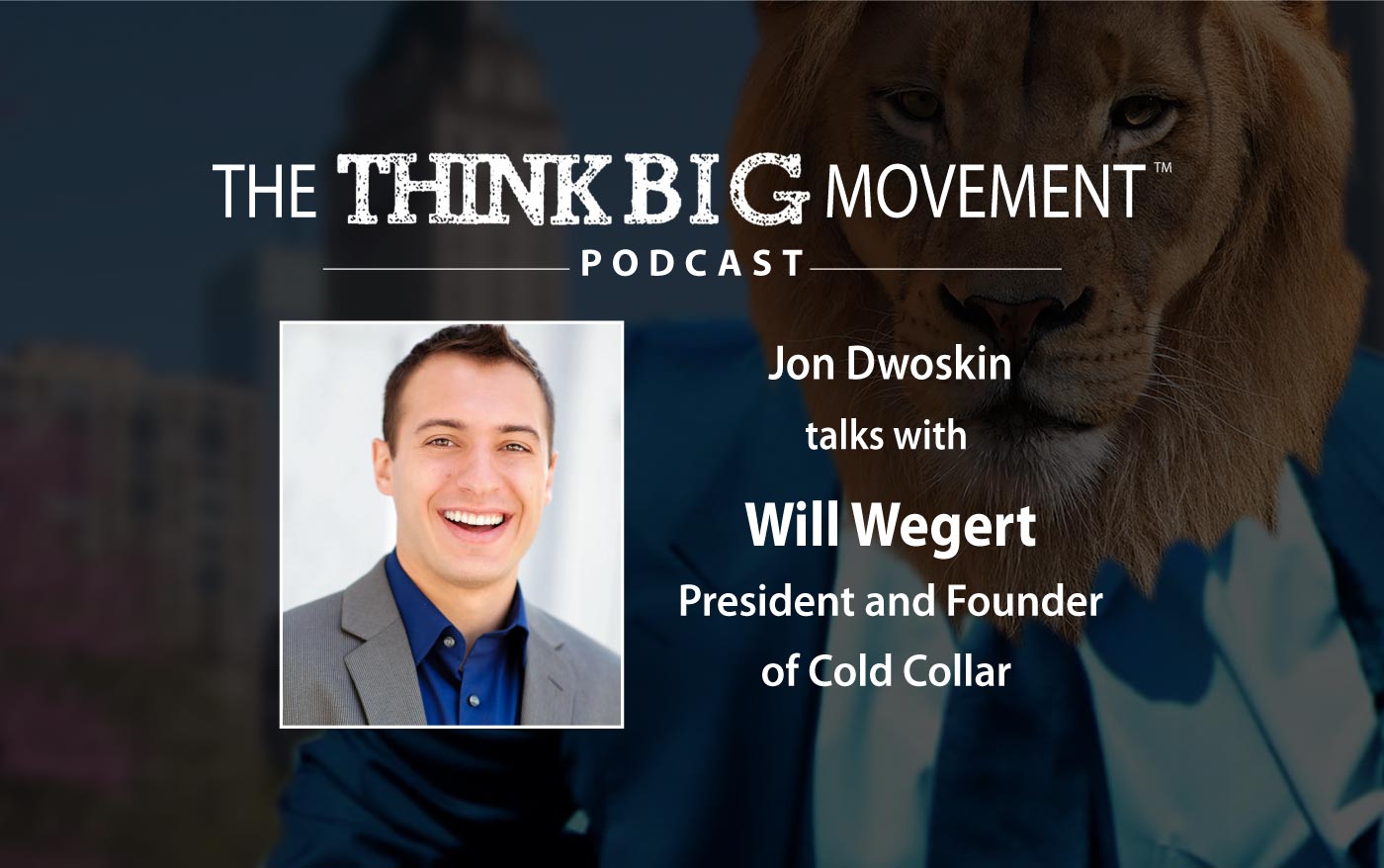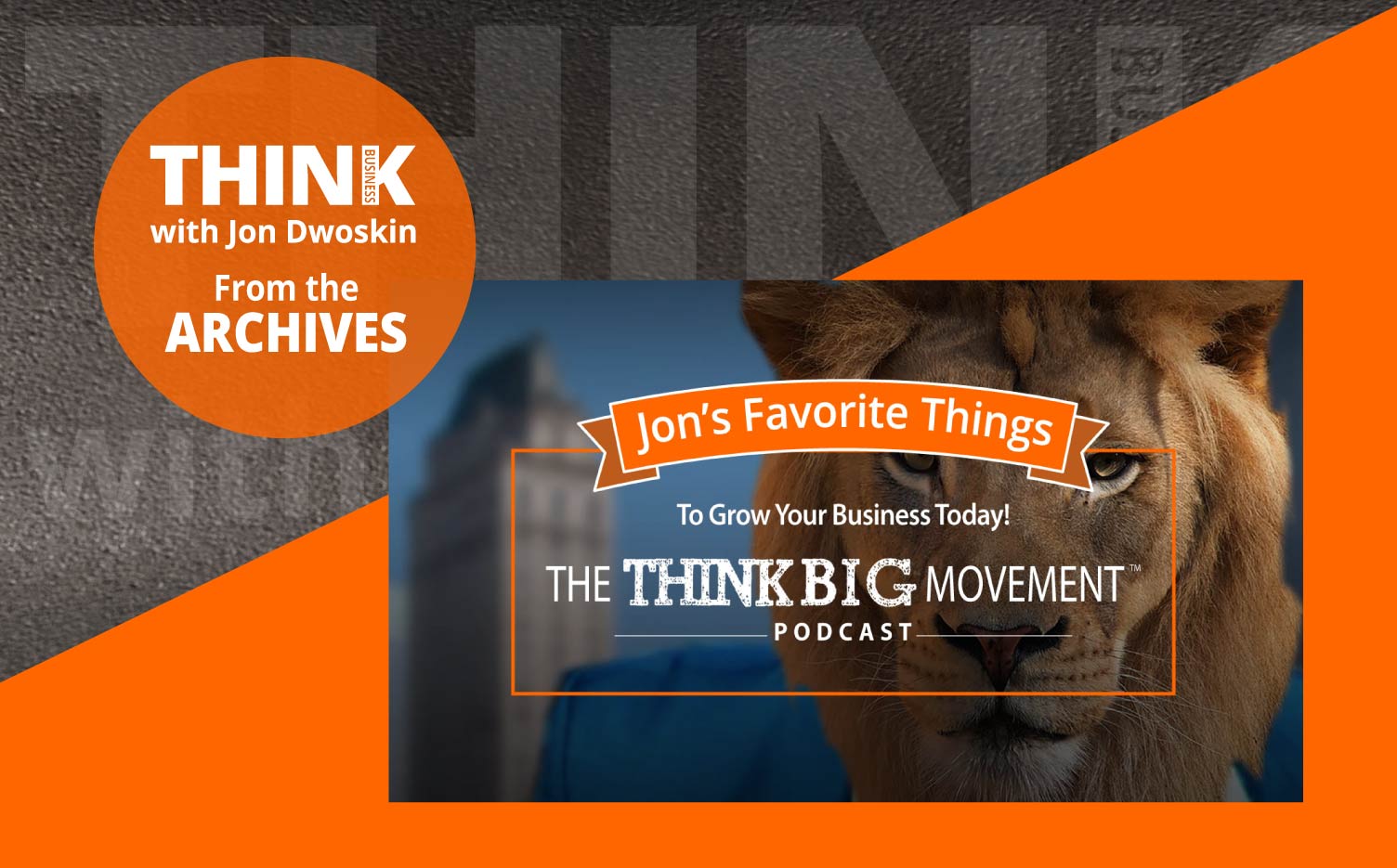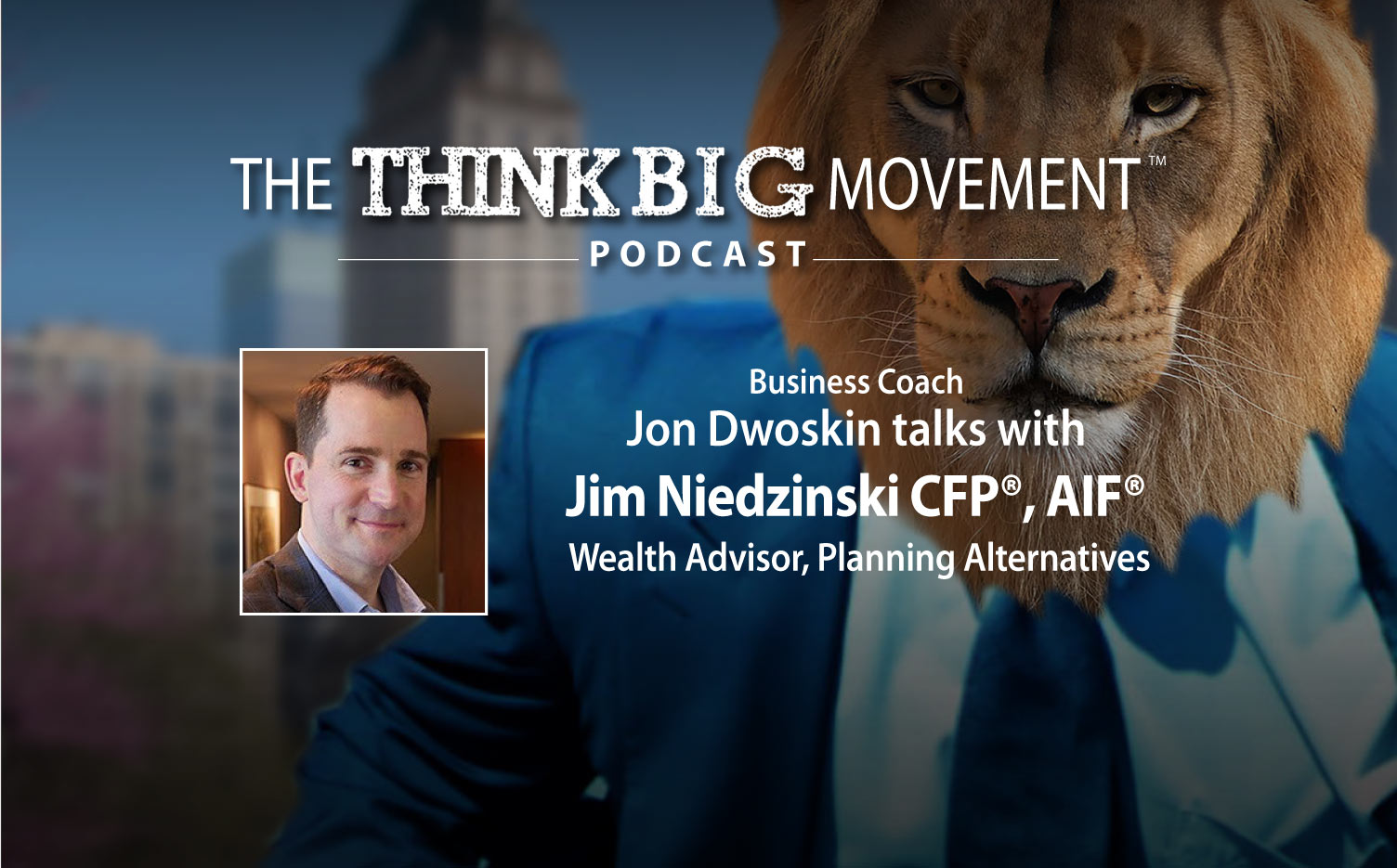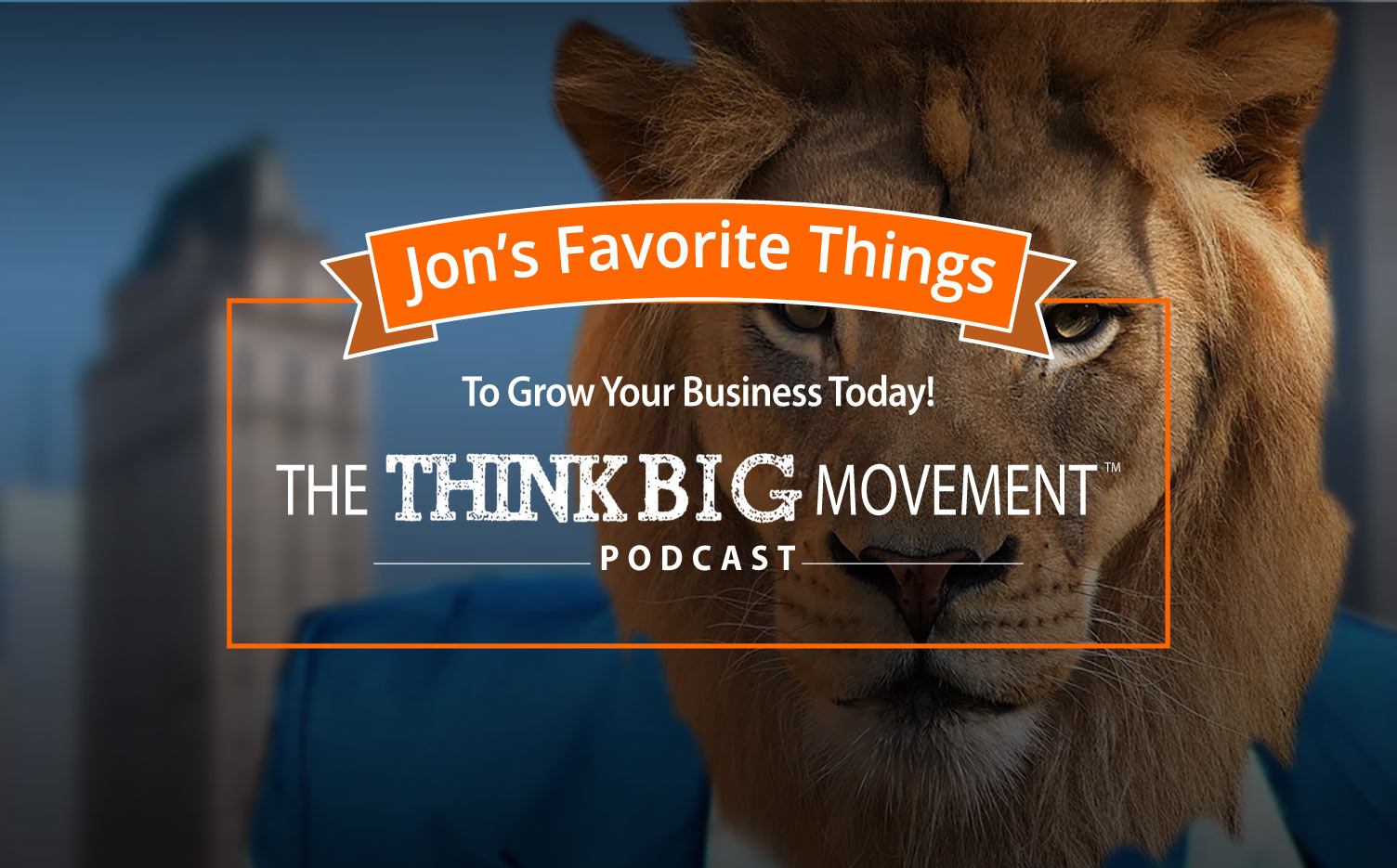
Will Wegert is a blogger, a public speaker and a resource for passionate job seekers. He’s a man on a mission to help as many job seekers as possible find work they love. He’s been featured in newspapers, podcasts, and media outlets across the globe.
When he’s not in the office, he might be zipping around on his motorcycle or tearing it up on an ATV in the beautiful mountains of Colorado.
*E – explicit language may be used in this podcast.
Read the transcript
Jon Dwoskin: Hey everybody, I’m Jon Dwoskin, an executive advisor and business coach. I work with successful business people who are stuck and want to take their company to the next level. Today, though, get ready to grow your business big, very big. In just a few seconds you’ll meet a dynamic business owner, executive, or sales person willing to share the best practices that fuel their growth and success. Each interview is no more than 15-ish minutes long, so you can quickly learn effective tools to put into your business today. Please listen with new ears and let’s get to learning, let’s get to growing, and let’s get to thinking big.
Everybody, welcome back and thanks for taking the time to listen to the Think Big Movement podcast. I’m really excited to have Will Wegert on the show, it’s kind of like yogurt with a “W” on the show.
Will Wegert: There you go.
Jon Dwoskin: He is the CEO and founder of Cold Collar. I have referred a bunch of people to him through the years. He’s a phenomenal resume re-builder who basically ensures and increases the probability of getting out there and getting the job that you want and dream of, but he’s also a recruiter matching up the right companies with the right people and the right people with the right companies.
One of the things that, as an executive advisor/ business coach, I always have been preaching is the importance of recruiting. I tell my clients all the time, ABR: always be recruiting. You should never be reactive when it comes to recruiting. Always proactive. So, Will, it’s great to talk to you and I hope you’re going to share a lot of nuggets about the importance of recruiting and having a job that you love. But fill in the gaps. Tell us more about you and your company and where you’re at and we’ll take it from there.
Will Wegert: Yeah, I love it. Hey, appreciate you having me on.
Jon Dwoskin: Yeah, of course.
Will Wegert: I’m excited to share a little bit about the world that I know. Yeah, my business, Cold Collar, been doing that for almost five years now and that’s really been my core passion. Helping people find amazing jobs and the natural next steps through that was partner up – a recruiting company – so now I’m really spearheading both to help amazing companies find amazing people. Really, bringing the two together. I love what I do. I think I’m going to be in this space for the rest of my life and it’s just really cool to find those. To really bring those two elements together.
Jon Dwoskin: So, you love what you do. I love that you say that you love what you do.
Will Wegert: I do.
Jon Dwoskin: So, how did you find the space? For those listening who don’t love what they do, how did you find the space? And how did you figure out that you love this? I mean, talk about that so people can use you as a bridge to get to what they love.
Will Wegert: I love to say that I dreamed of it all of my life, but it kind of happened upon me. I had a lot of jobs in a really short period of time and figured out I was really good at getting them. Didn’t like having them as much, so that’s when I decided to start my own company. I’ve been helping a lot of friends and family in their careers and it really just exploded from there.
I’m a huge believer – and even back in the early days – the concept of we’re going to spend 40, 50, 60 maybe between 80 and 100 hours a week working so why not do that in a space you really enjoy? Because when you enjoy it, you’re also better at it. Which means you make more money, which means you’re able to spend more on your family, which means you’re able to give more. I mean, it seems to be that linchpin to where it drives the rest of your life, really. So, putting the right people, getting connected with jobs you love. I mean, it’s absolutely vital.
Jon Dwoskin: I love the way that you map that out very step by step, because it seems so simple, yet for so many people it’s very difficult. Kudos to you for making the jump and growing your own business. But let’s talk about that a little bit, because your business has jumped a little bit through the years.
Well, I shouldn’t say jumped, but expanded, so I knew you used to do just resume writing and you’ve moved into resume writing and recruiting. So, can you talk about how you morphed? Why you morphed into just a larger scope? And how that works? And how companies work with you? And how people looking for jobs work with you?
Will Wegert: Yeah, so it’s really about listening to my customers, right? So, on the job seeker side, I knew I was talented at the resume space and I’ve grown a team underneath me that’s exceptionally talented, probably more so than I am. But, listening to them, it became very obvious to me that what people need is more than just a simple resume.
A resume is an awesome tool, but it’s just a tool, right? If you have a hammer or a screwdriver, you’ve got to know how to use it. Where I’ve really grown on the job seeker side and how it’s expanded is just by listening and realizing that most of my customers, what they ultimately wanted, was a job they loved. A resume was a great tool for that, but there were a lot more tools, and they needed to know how to use those tools.
Where we’ve expanded, one of the things that we do differently than most, is on the job seeker side with Cold Collar, is we’re exceptional at helping people not just have the right tools, but use them in exceptional ways. Does that make sense?
Jon Dwoskin: Well, it makes sense, but expand that. So we make sure that it makes sense to people listening. To use tools, you said something about using tools, because I think sometimes people have a lot of tools, but they don’t really know how to use their tools, and I think that is important, so talk on that if you can for a minute.
Will Wegert: I think, specifically, we talk about the tool and making it more concrete. The resume, right? It’s an amazing tool and a lot of people see that as the difference between not getting called back and getting call backs. But, ultimately people are the biggest motivator and when you can connect with people, I mean, use the resume as a tool to get in the door.
A lot of the coaching we do, that’s circled around the resume. The resume is the foundational piece in that, but a lot of the coaching we do guides people on how to crack the door, and how to create true authentic conversations instead of just being a spam, throw your resume to 400 companies, and hope one sticks.
So it’s a lot about diving into the career with clarity and where your skills and value are. There’s a lot of coaching built around them, personal branding and personal marketing, and how to actually get in front of not just anyone, but the right people. Then to turn that into interviews and offers.
Jon Dwoskin: You know, that’s really insightful what you’re talking about because what I hear you saying is, it’s about knowing what you really want. That’s the foundation. But before somebody comes to you or, really, they don’t really need to know, I’m sure you can help guide them there, but they need to know what they want. Once they’re in that space, then they can be authentic. Then once they’re in that space they can actually connect better with people and do exactly what you talked about earlier and have the whole continuum of a better life, but it starts with the self-realization and taking the time and the prep time, I think.
Tell me what your thoughts are about knowing exactly what you want and then not settling for complacency and mapping out and getting the life that you want, which a lot of times starts with a career and not a job. And that’s where you come in to build a resume and help morph someone into the right culture.
Will Wegert: Yeah. I’m 100% in agreement with that and I think it’s actually super interesting, the words you just used, and it’s getting really dialed in, getting really insanely clear in what you want. I think the same is true, and I think this is the less obvious to people, but the same is true in the recruiting side. I think that is the single biggest problem that most people have when they are hiring you.
They have never taken the time to define what they really want. They often say things like, “Well, I want five years of experience in the field,” or “I want this certification, I want this background, or someone who’s worked at this company.” But instead of figuring out, they come up with all of these lists of tasks they want them to have. Check boxes to check off, instead of realizing what they want that person to accomplish.
Most folks going through the hiring process do not take enough time to dive in to say, “Hey, in the first 30 days, I want this person to accomplish A, B, and C. And the first 90 days, I want them to accomplish A, B, and C. Here’s what they’re going to do ultimately for my business and can they accomplish that?
A lot of times, that changes the entire dynamic of the recruiting process, because instead of looking for skills or certifications, you’re looking for someone who can get what you want done and that means that you can oftentimes hire people who may be less traditional, but it means they’re also a lot less sought after, but if they can accomplish the core task that you want, which starts with identifying those core tasks, they’re the right person for the job, whether or not they have certifications or past experience.
Jon Dwoskin: Right. It’s almost like matching the cultures. It’s about connection and it’s about matching the culture and bringing somebody in that fits the culture. Somebody can meet all the requirements, but not fit the culture and when you hire that person in, they can disrupt the culture and it has negative consequences. Usually that person is short lived, because within three or six months-ish, give or take, that person realizes, this isn’t where I want to be, and the culture doesn’t fit me, and they will ultimately end up finding a place that they fit.
Will Wegert: So true. So true. I think diving into those specifics, diving into that, when you’re going, when you’re attacking the search, it might take an hour or two to really spend time on your team, identifying what those tangible elements, what parts of the culture fit and aren’t, but being able to identify those upfront, that’s going to save you months and years of hassle down the road.
Jon Dwoskin: Absolutely. You talked earlier about listening to your clients and that’s what allowed you to understand where you needed to morph and grow your business. Speak a little bit on that because I think that’s important, and not only listening to your clients, but hearing what your clients are saying is really, really important. So, maybe you can chat on that for a minute.
Will Wegert: Yeah. You’re an entrepreneur, I’m an entrepreneur, most people who are listening to this probably have some entrepreneurial streak at the very least. I think one of the biggest weaknesses we have as entrepreneurs is we love ideas and the separation between ideas and actions can be huge. I think one thing that has been a struggle for me, but the more I do it the more my business grows, is really getting clear on what specifically … I lost my train of thought here. Your question again? It will hit me.
Jon Dwoskin: We talked about working with your clients, you really listen to them and-
Will Wegert: Oh, listening to them. Yeah.
Jon Dwoskin: … but you heard what they were saying and on how to take the next path of your growth and business.
Will Wegert: Yeah. You see, early on I used to throw a lot of ideas at people. Ideas, ideas, ideas, as a natural entrepreneur instead of just waiting. I think just grabbing that small space, early on in my resume business, I was trying to do personal websites, and I was trying to do all of these things that are only remotely related to the resume space. What I realized is, hey, when I really focus in on becoming exceptional at one small thing within space, then my customers tell me what they want instead of me coming up with a thousand ideas additionally to throw at them. That’s been a game changer.
It’s become really good at one tiny small thing and then just listen to what naturally can be added to that, instead of trying to artificially add things that are only in my head, but that my customer may or may not actually want.
Jon Dwoskin: I think just knowing you a bit, you are so clear in what you want, so you’re so authentic so you can connect so well with your clients that it makes it an easier space to actually listen and hear what they’re saying, so it can guide you on a clearer path of the direction and growth of your business. I think people listening will be encouraged by that. To know, get in alignment with, what you want to do and get excited and be excited. It makes things much easier because business is hard.
Will Wegert: I really think that’s my biggest “think big”. As I’ve been encouraged and inspired in watching what you’re doing with your book, and that’s probably my biggest “think big practice” or “think big idea” is to think big in small spaces. I think thinking big is awesome, but think big by listening to your customers and think big within an isolated box. That was something, as a young guy, as an entrepreneur, it was just so difficult for me early on and I had to grab mentors and grab folks around me who could help me.
It’s this theme over and over that I saw. It’s make your box smaller, say no to more things, and it’s been crazy to see the … I mean, I never would have thought recruiting, but within this box of connecting amazing people with amazing companies, recruiting falls naturally on that. It’s what’s in this box, this small box of connecting amazing people with amazing companies, and now all of a sudden, I’ve gone from a resume writer to a pretty comprehensive job search coach and pay, and it’s just over and over again I’m able to expand. When you can expand within a box and have that niche and be identified and known for one small thing. That’s the biggest way I have ever been challenged to think, really ever.
Jon Dwoskin: I love it. I love it. Will, in our last minute together, tell or share your favorite book, your favorite podcast, your favorite quote, your favorite article, something that people can take or walk away with a nugget. Another nugget. You’ve given lots of nuggets.
Will Wegert: Love it. Love it. Yeah, I’d say for my favorite book, I love personal development, I love all that stuff. I love fast, passion, action, but I think the thing that resonates most with me is slow progress. My favorite book, Darren Hardy, “The Compound Effect”, has just been so profound for me. I’ve seen it translate in business, in life, in marriage, in health, in fitness. An incredible, incredible book. Highly recommend that. So, yeah.
Jon Dwoskin: That is one of my all-time favorite books. I just had another interview with a guest that talked about “The Compound Effect” being one of their favorite books. It’s one of my all-time favorite books as well. Do small things on a consistent basis and that defines thinking big. You and I are on the same page. Well, tell everybody-
Will Wegert: Love it.
Jon Dwoskin: Love it. Tell everybody how to get ahold of you.
Will Wegert: Best way is probably through Linkedin. I’m pretty active. I’m on Linkedin all the time. Whether it’s recruiting, whether it’s resume, whether it’s job seeker, I’ve got my phone number, my email on there, just you Google “Will Wegert”, you can usually find my Linkedin, my personal website. I’ve got a lot of digital stuff, but the one place that I think of it’s Linkedin.com/in/willwegert.
Jon Dwoskin: And spell your full name so people don’t get it wrong.
Will Wegert: Yep. W-I-L-L W-E-G-E-R-T.
Jon Dwoskin: Alright. Will, it’s been a pleasure. Continue to have fun growing your business and stay excited. It’s always fun talking to you. Thanks for your time, thanks for being a guest, and excited to continue to see how you grow your business.
Will Wegert: Hey, Jon, you as well. Thanks a bunch. This has been a blast.
Jon Dwoskin: All right, buddy. Thanks pal.
Will Wegert: Yep. Take care.
Jon Dwoskin: Bye.
Thank you for listening to The Think Big Movement podcast. For show notes and links to anything we talked about, please visit jondwoskin.com. For additional best business practices, you may enjoy my latest book, The Think Big Movement: Grow your business big. Very Big. Lastly, if you want to talk to me about advising and coaching your business, please email me jon@jondwoskin.com, text or call me at 248-535-7796. Have an amazing day, an amazing week and as always, think big.



